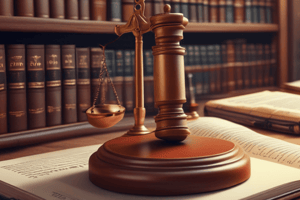Podcast
Questions and Answers
What is the definition of law?
What is the definition of law?
The law is a set of enforceable rules of conduct that establish guidelines for relationships between people and organizations in a society.
How do customs, rules, and laws differ from one another?
How do customs, rules, and laws differ from one another?
Customs are traditional practices, rules are specific directives for behavior, and laws are formal regulations with legal consequences.
What is the difference between values and ethics?
What is the difference between values and ethics?
Values are fundamental beliefs that shape our attitudes, while ethics are moral principles that guide our conduct in specific situations.
Describe the characteristics of just laws.
Describe the characteristics of just laws.
What are the three key elements of justice?
What are the three key elements of justice?
Define procedural fairness.
Define procedural fairness.
Explain the significance of access in the context of justice.
Explain the significance of access in the context of justice.
What role do ethics play in decision-making?
What role do ethics play in decision-making?
What are the fundamental principles that must be adhered to in the administration of justice?
What are the fundamental principles that must be adhered to in the administration of justice?
Define anarchy in the context of societal governance.
Define anarchy in the context of societal governance.
What is tyranny and how does it influence governance?
What is tyranny and how does it influence governance?
Outline the historical origin of common law.
Outline the historical origin of common law.
How do the concepts of equity and precedent function within the Australian court system?
How do the concepts of equity and precedent function within the Australian court system?
Describe the adversarial system of trial adopted by the Australian court system.
Describe the adversarial system of trial adopted by the Australian court system.
Examine the court hierarchy in Australia and its jurisdiction.
Examine the court hierarchy in Australia and its jurisdiction.
What is the role of parliament in the context of Australian law?
What is the role of parliament in the context of Australian law?
Flashcards are hidden until you start studying
Study Notes
BASIC LEGAL CONCEPTS
- Law consists of enforceable rules of conduct governing relationships between individuals and organizations in society.
- Customs are traditional societal practices, while rules are specific directives established to regulate behavior; laws are formal regulations set by authorities with legal consequences for non-compliance.
- Values are fundamental beliefs shaping attitudes and behaviors; ethics are moral principles guiding conduct and decision-making.
CHARACTERISTICS OF JUST LAWS
- Just laws are characterized by fairness, equality, and impartiality, applying equally to all individuals and upholding human rights.
- Justice embodies fairness, equity, and moral righteousness, balancing competing interests and promoting individual and community well-being.
- Equality under the law ensures all individuals are treated equally, ensuring fairness and impartiality in legal proceedings.
- Fairness involves unbiased application of laws, providing transparent opportunities for all parties to present their cases.
- Access ensures removal of barriers to legal resources, enabling all individuals to seek legal remedies.
PROCEDURAL FAIRNESS
- Procedural fairness, or principles of natural justice, ensures impartial conduct of legal proceedings, giving both parties a fair chance to present their case.
- Key principles include the right to a fair hearing, unbiased decision-making, and transparency in justice administration.
ANARCHY AND TYRANNY
- Anarchy is characterized by disorder due to the absence or non-recognition of authority, leading to a breakdown in societal compliance with laws.
- Tyranny refers to cruel and oppressive government rule.
SOURCES OF CONTEMPORARY AUSTRALIAN LAW - COMMON LAW
- Common law originated in medieval England under King Henry II, who established royal courts to administer justice, relying on legal precedents and customary laws.
- The Australian judicial system is influenced by British principles, including equity (adding fairness) and precedent (guiding lower court decisions).
- The adversarial system of trial, originated in British legal tradition, features opposing parties presenting cases before an impartial judge or jury.
COURT HIERARCHY
- The Australian court hierarchy consists of state and territory courts (e.g., magistrates' courts, supreme courts) and federal courts (e.g., Federal Circuit Court, High Court of Australia).
- State courts address matters relating to state laws, while federal courts handle cases involving federal laws, interstate disputes, and constitutional issues.
STATUTE LAW
- The Parliament of Australia plays a central role in the legislative process, structuring laws and governance through enacted statutes.
Studying That Suits You
Use AI to generate personalized quizzes and flashcards to suit your learning preferences.



